Betty Collins was born and raised in Tulsa, but the eighth grade history teacher hadn't been to the state Capitol in Oklahoma City until last spring, when she educators throughout the state walked off the job to protest for better wages and public school funding.
Since that successful walkout, Collins has volunteered for pro-education political campaigns and revived her school's Parent Legislative Action Committee chapter. She has also been back to the Statehouse twice this year to press officials from her district to support public schools and helped host a meet-and-greet with area lawmakers at her school.
The continued political engagement of Collins, many other educators like her and their supporters suggests that the teacher movement that sparked walkouts in half a dozen states last year didn't end with the election of dozens of teachers to state legislatures or hard-won gains in teacher pay and school funding. Teacher unions in Oklahoma and other walkout states, including Arizona, Kentucky and West Virginia, all report increases in membership since the demonstrations, and many are busy recruiting political candidates for 2020.
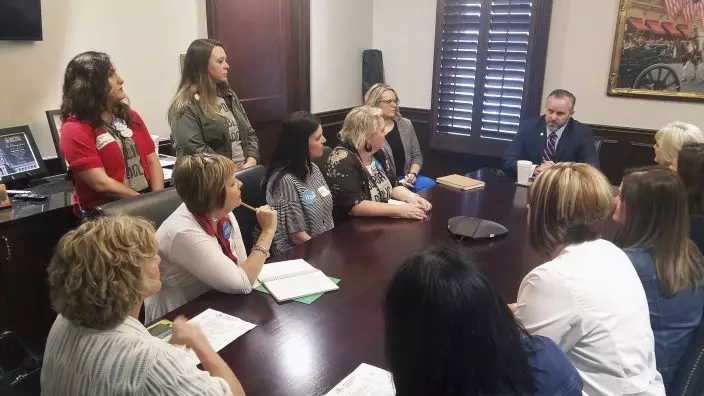
In this April 16, 2019, photo, parents from Putnam City, Edmond and Deer Creek public school districts meet with Senate President Pro Tempore Greg Treat, R-Oklahoma City at his Capitol office in Oklahoma City, Oka. Although there was no organized walkout in Oklahoma this year, teachers and parents visited regularly with their lawmakers to lobby for education, and new Parent Legislative Action Committee chapters are popping up at districts across the state. (Courtesy of Erin Brewer via AP).
"The main thing for me is getting other teachers to be active," Collins said. "We've found that teachers have a huge voice, and if we can just get more teachers more engaged, that voice will only be louder and harder to ignore."
In Oklahoma, the movement resulted in a slight philosophical shift in the Republican-controlled Legislature. A record number of teachers ran for and won seats in the Legislature last year, and energized supporters participated in political campaigns and helped oust a record 12 Republican incumbents from office, including eight who had voted against a tax hike to fund teacher raises.
Spurred by the threat of a work stoppage last year, the Oklahoma Legislature has now given teachers most of what they wanted for two consecutive years, including big boosts in public school funding and back-to-back pay raises.
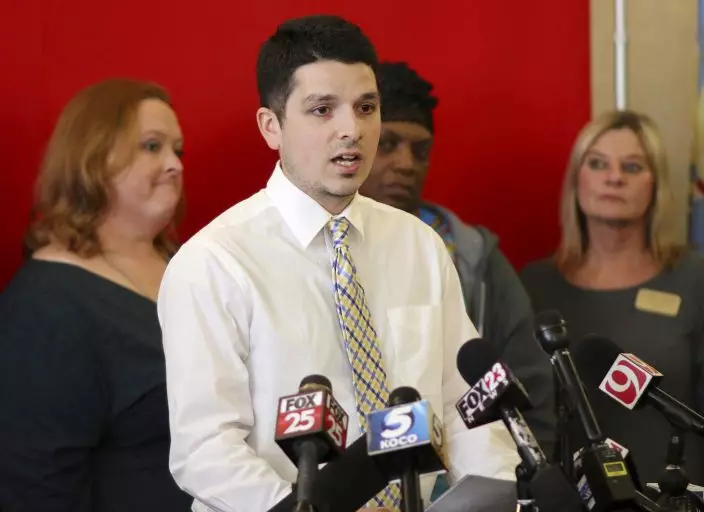
FILE - In this Thursday, March 8, 2018 file photo Alberto Morejon, Stillwater teacher and administrator of the Facebook group "Oklahoma Teacher Walkout- The Time is Now," speaks during a media conference at the Oklahoma Education Association in Oklahoma City. (Doug HokeThe Oklahoman via AP, File)
"The thing is, you don't have to change party control in the Legislature or even change legislators to affect change" there, said Keith Gaddie, a professor and political scientist at the University of Oklahoma. "All you have to do is scare them. And every lawmaker is going to scoff when someone like me says you have to scare them, but the fact is they are all scared to lose re-election."
Although there was no organized walkout this year, teachers continued to be a presence at the Capitol. Delegations of teachers and administrators from throughout the state regularly met with their elected officials to lobby for education and oppose measures they viewed as anti-public education, such as a bill that would have extended tax credits for private school scholarships.
"I lovingly refer to it as 'teacher Tuesdays' because most of the schools that I represent have continuous delegations that come every Tuesday," said state Sen. Carri Hicks, a Democrat and former elementary school teacher who won what had been a Republican-held seat in northwestern Oklahoma City last November. "It's a very tangible reminder that the education community is watching."
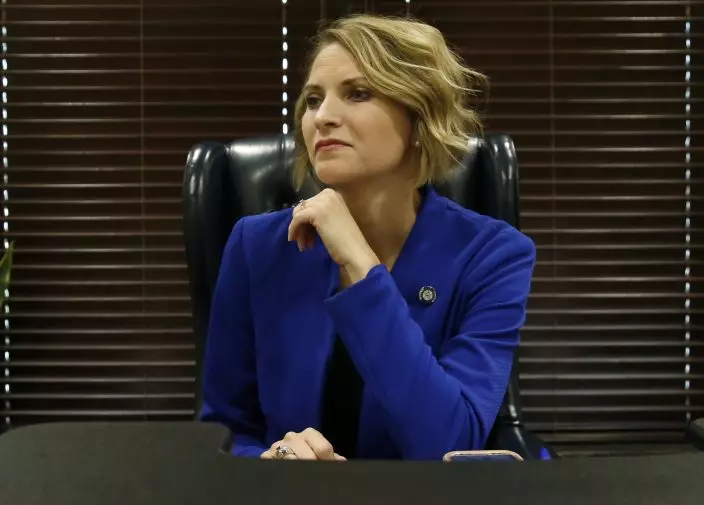
Oklahoma state Sen. Carri Hicks, D-Oklahoma City, listens to a question during an interview in her office Wednesday, May 8, 2019, in Oklahoma City. Hicks is a Democrat and former elementary school teacher who won what had been a Republican-held seat in northwest Oklahoma City last November. (AP PhotoSue Ogrocki)
Parents are also becoming more politically active, with new Parent Legislative Action Committee chapters, which are nonpartisan groups of pro-education volunteers, popping up in school districts throughout the state.
Misty Bradley, a mother of three school-age children in the Oklahoma City suburb of Edmond, said it was during the teacher walkout that she saw photos of public schools with broken furniture, leaky roofs and textbooks that dated back to her own high school days.
"I already knew that teachers weren't paid and respected enough, but I definitely was awakened to the reality that it was a lot worse than I'd ever understood," Bradley said. "I was ashamed for our state."
Bradley and a group of other parents from her district helped form a PLAC chapter, and for the first time, she became involved in a political campaign.
"I gave money. I talked to neighbors and friends about who they were voting for. I began to have conversations that I would have avoided before. It was too important not to say something."
Although there have been clear legislative victories for public education, some Republicans are still bitter about the walkouts. Bills were introduced this year to punish teachers who participate in walkouts, and although they didn't pass, the Oklahoma Republican Party changed its platform to call for withholding state funds for school districts that close during walkouts.
"I've always said it's going to take two election cycles to make a difference," said Alberto Morejon, an eighth grade history teacher from Stillwater whose Facebook page has become an online meeting place for teachers across the state. "After the walkout last year, I think we made a huge difference in the House. ... But in 2020, we have to make a huge difference in the Senate if we want to continue to help public education."
Follow Sean Murphy on Twitter: https://twitter.com/apseanmurphy
UNITED NATIONS (AP) — The United States vetoed a widely backed U.N. resolution Thursday that would have paved the way for full United Nations membership for Palestine, a goal the Palestinians have long sought and Israel has worked to prevent.
The vote in the 15-member Security Council was 12 in favor, the United States opposed and two abstentions, from the United Kingdom and Switzerland. U.S. allies France, Japan and South Korea supported the resolution.
The strong support the Palestinians received reflects not only the growing number of countries recognizing their statehood but almost certainly the global support for Palestinians facing a humanitarian crisis caused by the war in Gaza, now in its seventh month.
The resolution would have recommended that the 193-member U.N. General Assembly, where there are no vetoes, approve Palestine becoming the 194th member of the United Nations. Some 140 countries have already recognized Palestine, so its admission would have been approved, likely by a much higher number of countries.
U.S. deputy ambassador Robert Wood told the Security Council that the veto “does not reflect opposition to Palestinian statehood but instead is an acknowledgment that it will only come from direct negotiations between the parties."
The United States has “been very clear consistently that premature actions in New York — even with the best intentions — will not achieve statehood for the Palestinian people,” deputy State Department spokesman Vedant Patel said.
His voice breaking at times, Palestinian U.N. Ambassador Riyad Mansour told the council after the vote: “The fact that this resolution did not pass will not break our will and it will not defeat our determination.”
“We will not stop in our effort,” he said. “The state of Palestine is inevitable. It is real. Perhaps they see it as far away, but we see it as near.”
This is the second Palestinian attempt for full membership and comes as the war in Gaza has put the more than 75-year-old Israeli-Palestinian conflict at center stage.
Palestinian President Mahmoud Abbas first delivered the Palestinian Authority’s application for U.N. membership in 2011. It failed because the Palestinians didn’t get the required minimum support of nine of the Security Council’s 15 members.
They went to the General Assembly and succeeded by more than a two-thirds majority in having their status raised from a U.N. observer to a non-member observer state in 2012. That opened the door for the Palestinian territories to join U.N. and other international organizations, including the International Criminal Court.
Algerian U.N. Ambassador Amar Bendjama, the Arab representative on the council who introduced the resolution, called Palestine’s admission “a critical step toward rectifying a longstanding injustice" and said that “peace will come from Palestine’s inclusion, not from its exclusion.”
In explaining the U.S. veto, Wood said there are “unresolved questions” on whether Palestine meets the criteria to be considered a state. He pointed to Hamas still exerting power and influence in the Gaza Strip, which is a key part of the state envisioned by the Palestinians.
Wood stressed that the U.S. commitment to a two-state solution, where Israel and Palestine live side-by-side in peace, is the only path for security for both sides and for Israel to establish relations with all its Arab neighbors, including Saudi Arabia.
“The United States is committed to intensifying its engagement with the Palestinians and the rest of the region, not only to address the current crisis in Gaza, but to advance a political settlement that will create a path to Palestinian statehood and membership in the United Nations,” he said.
Mansour, the Palestinian U.N. ambassador, reiterated the commitment to a two-state solution but asserted that Israel believes Palestine "is a permanent strategic threat."
"Israel will do its best to block the sovereignty of a Palestinian state and to make sure that the Palestinian people are exiled away from their homeland or remain under its occupation forever,” he said.
He demanded of the council and diplomats crowded in the chamber: “What will the international community do? What will you do?”
Israeli-Palestinian negotiations have been stalled for years, and Israel’s right-wing government is dominated by hard-liners who oppose Palestinian statehood.
Israeli U.N. Ambassador Gilad Erdan called the resolution “disconnected to the reality on the ground” and warned that it “will cause only destruction for years to come and harm any chance for future dialogue.”
Six months after the Oct. 7 attack by the Hamas militant group, which controlled Gaza, and the killing of 1,200 people in “the most brutal massacre of Jews since the Holocaust,” he accused the Security Council of seeking “to reward the perpetrators of these atrocities with statehood.”
Israel’s military offensive in response has killed over 32,000 Palestinians, according to Gaza’s health ministry, and destroyed much of the territory, which speaker after speaker denounced Thursday.
After the vote, Erdan thanked the United States and particularly President Joe Biden “for standing up for truth and morality in the face of hypocrisy and politics.”
He called the Palestinian Authority — which controls the West Bank and the U.S. wants to see take over Gaza where Hamas still has sway — “a terror supporting entity.”
The Israeli U.N. ambassador referred to the requirements for U.N. membership – accepting the obligations in the U.N. Charter and being a “peace-loving” state.
“How can you say seriously that the Palestinians are peace loving? How?” Erdan asked. “The Palestinians are paying terrorists, paying them to slaughter us. None of their leaders condemns terrorism, nor the Oct. 7 massacre. They call Hamas their brothers.”
Despite the Palestinian failure to meet the criteria for U.N. membership, Erdan said most council members supported it.
“It’s very sad because your vote will only embolden Palestinian rejectionism every more and make peace almost impossible,” he said.
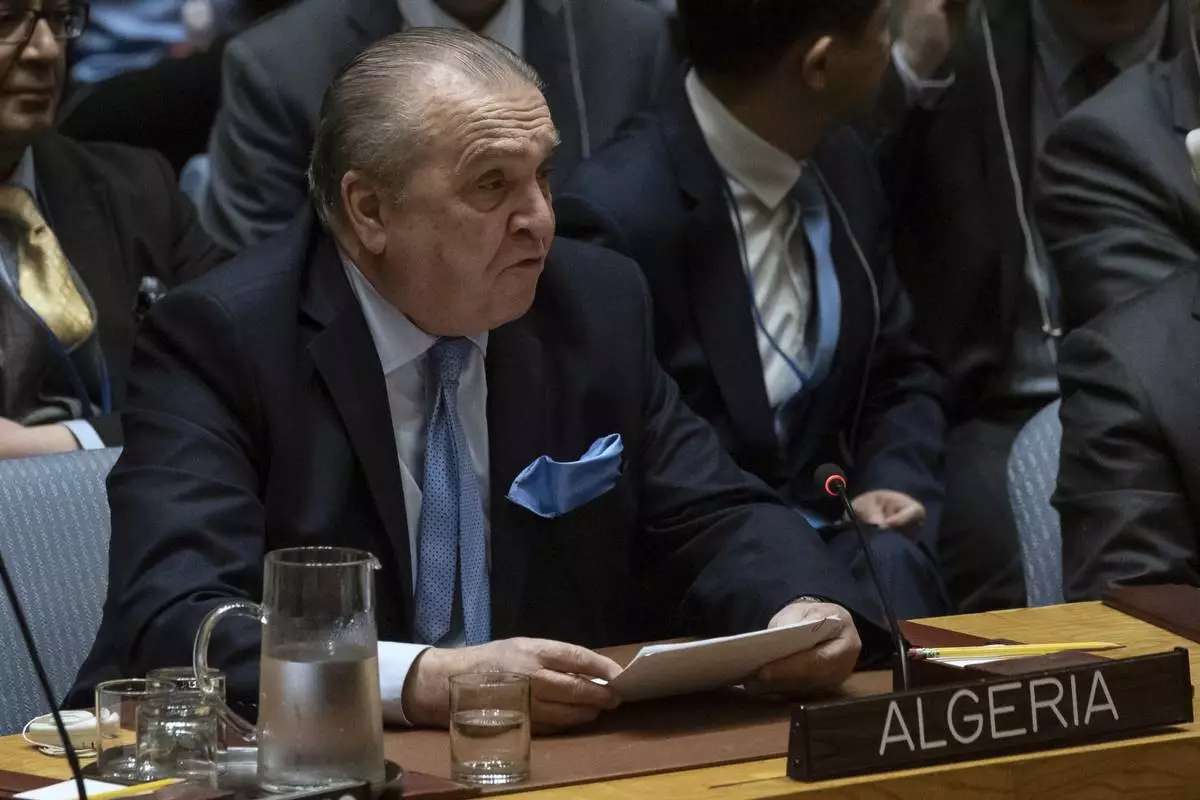
Algeria's Permanent Ambassador to the United Nations Amar Bendjama speaks during a Security Council meeting at United Nations headquarters, Thursday, April 18, 2024. (AP Photo/Yuki Iwamura)
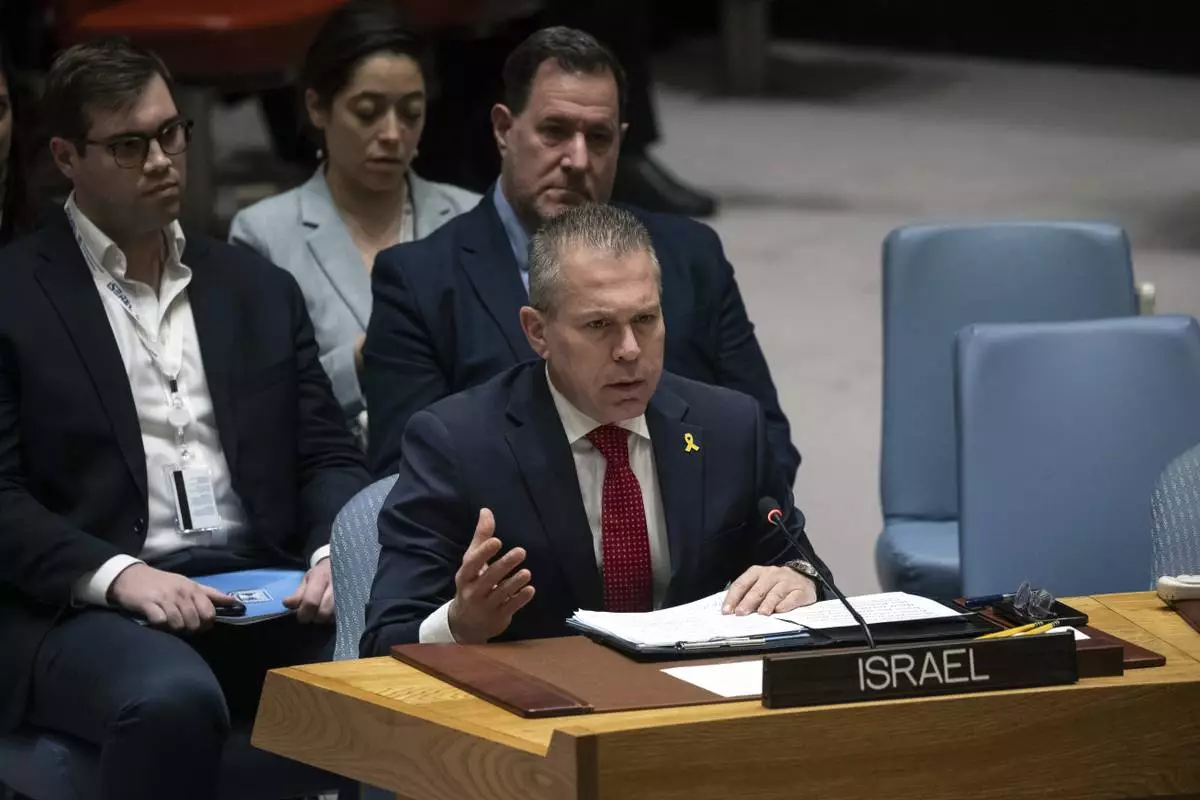
Israeli Ambassador to the United Nations Gilad Erdan speaks during a Security Council meeting at United Nations headquarters, Thursday, April 18, 2024. (AP Photo/Yuki Iwamura)
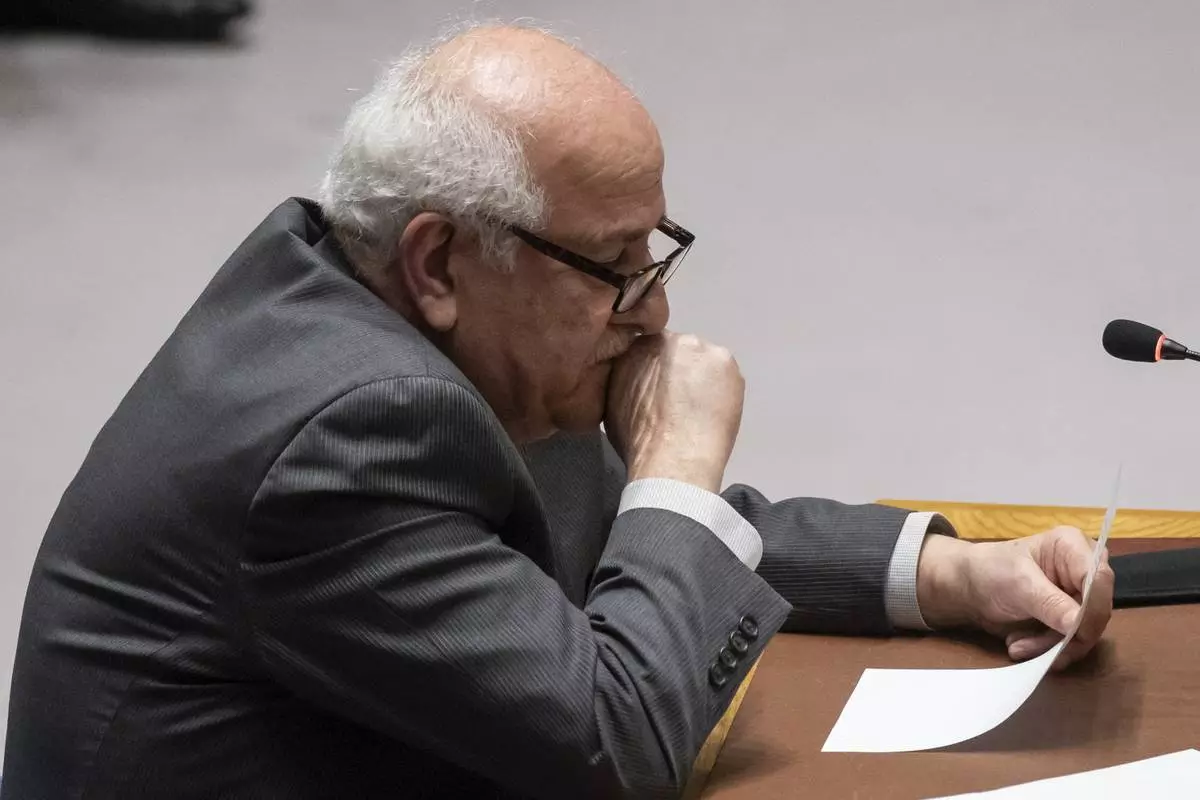
Palestinian Ambassador to the United Nations Riyad Mansour holds tears while speaking during a Security Council meeting at United Nations headquarters, Thursday, April 18, 2024. (AP Photo/Yuki Iwamura)
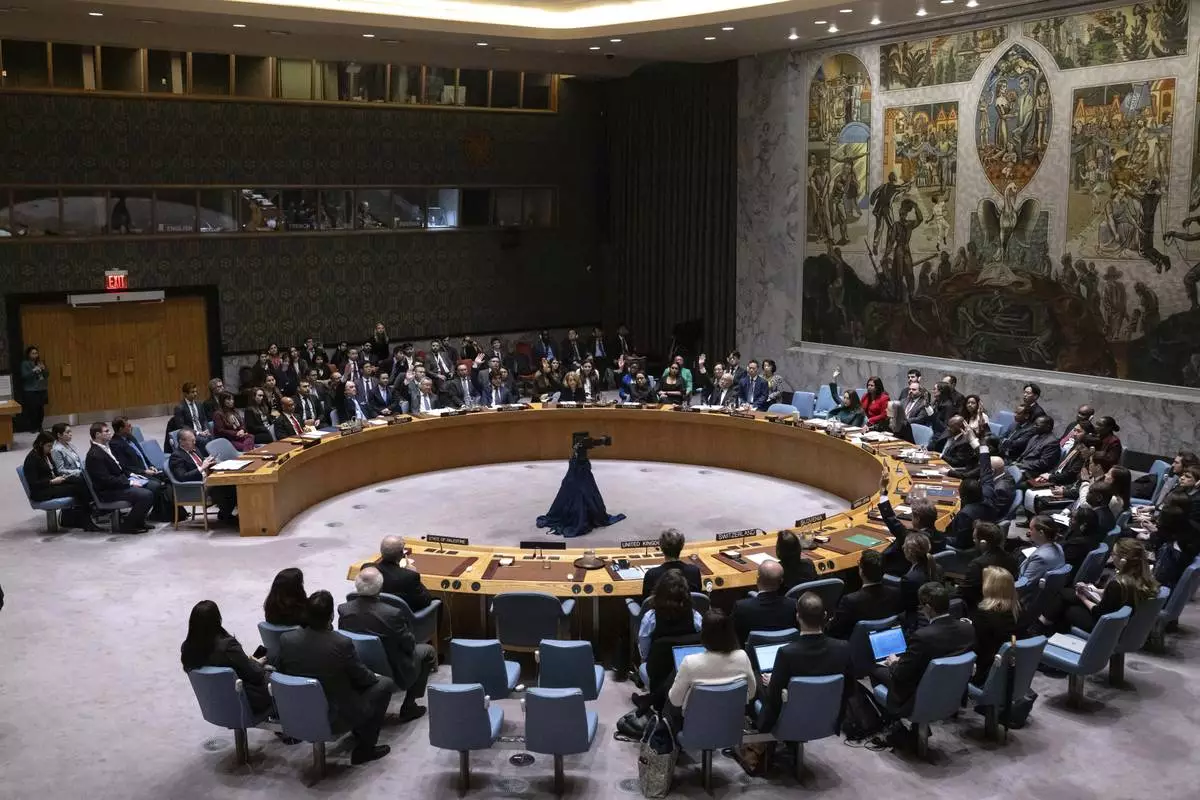
Representatives of member countries take votes during a Security Council meeting at United Nations headquarters, Thursday, April 18, 2024. (AP Photo/Yuki Iwamura)
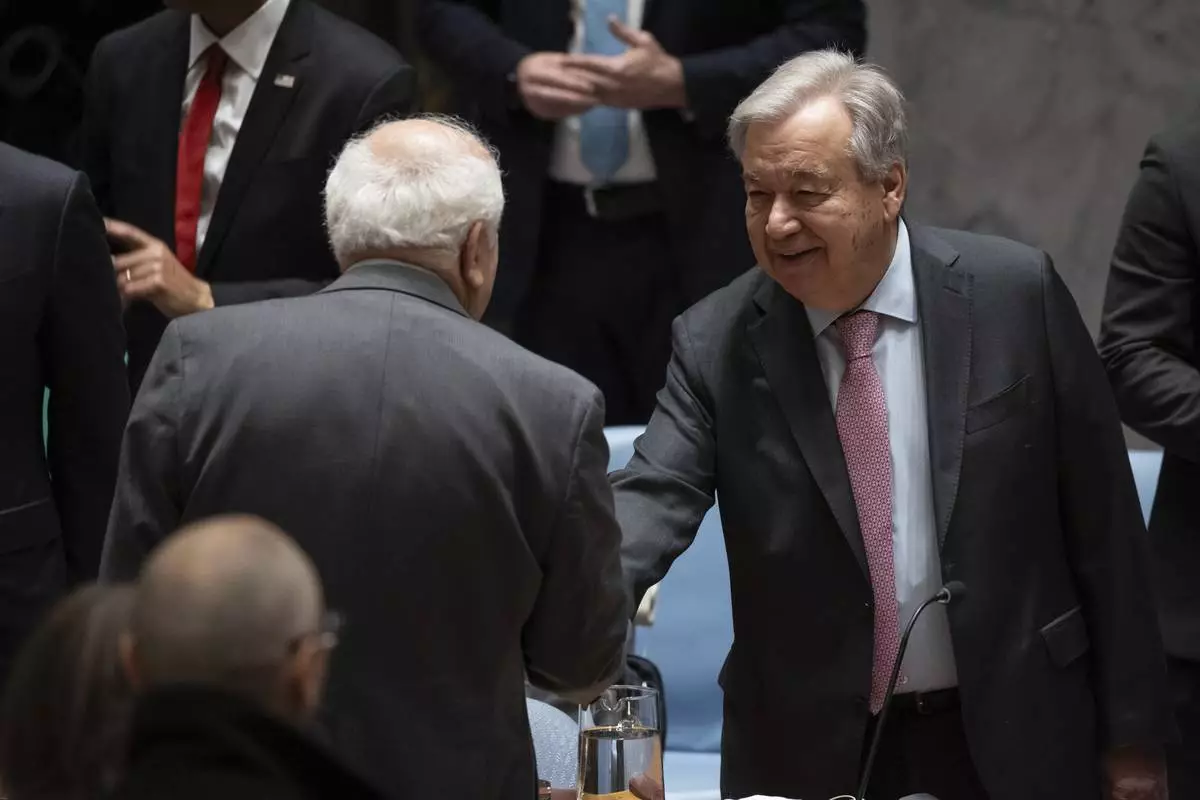
Palestinian Ambassador to the United Nations Riyad Mansour, left, and United Nations Secretary-General Antonio Guterres speak before a Security Council meeting at the United Nations headquarters, Thursday, April 18, 2024. (AP Photo/Yuki Iwamura)
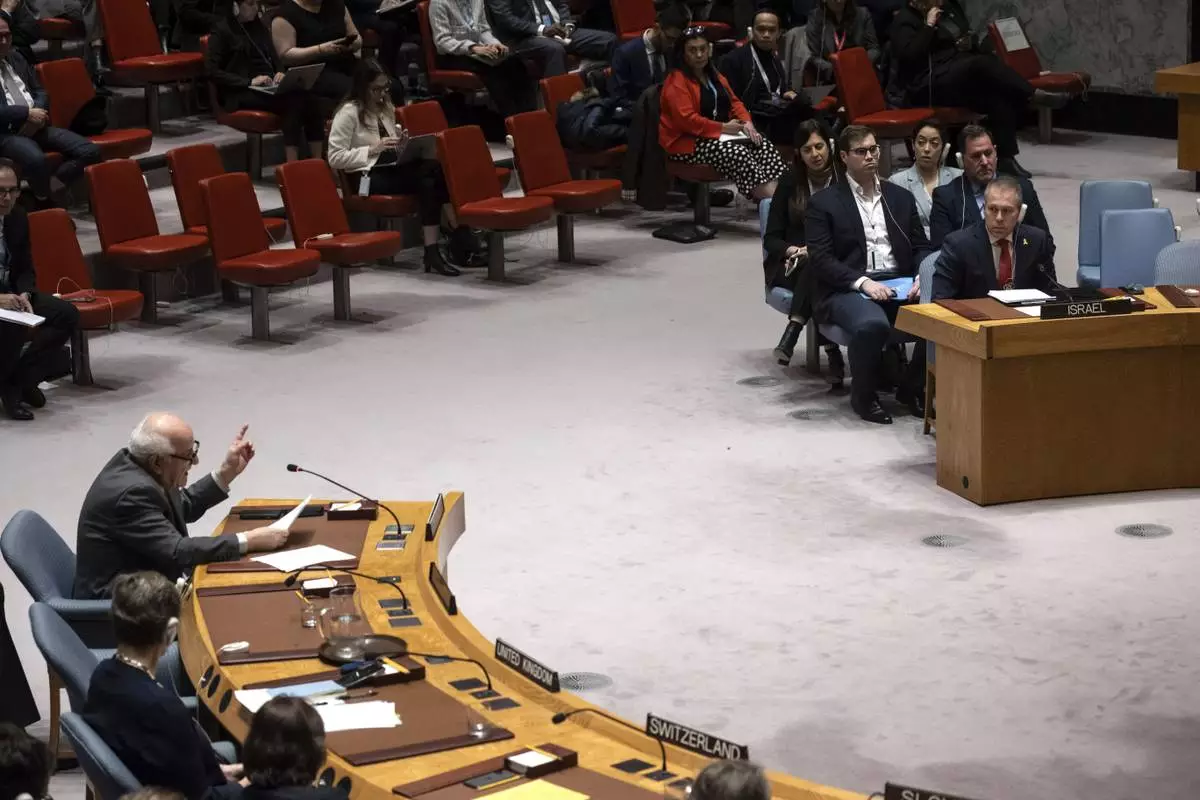
Palestinian Ambassador to the United Nations Riyad Mansour speaks during a Security Council meeting at United Nations headquarters, Thursday, April 18, 2024. (AP Photo/Yuki Iwamura)
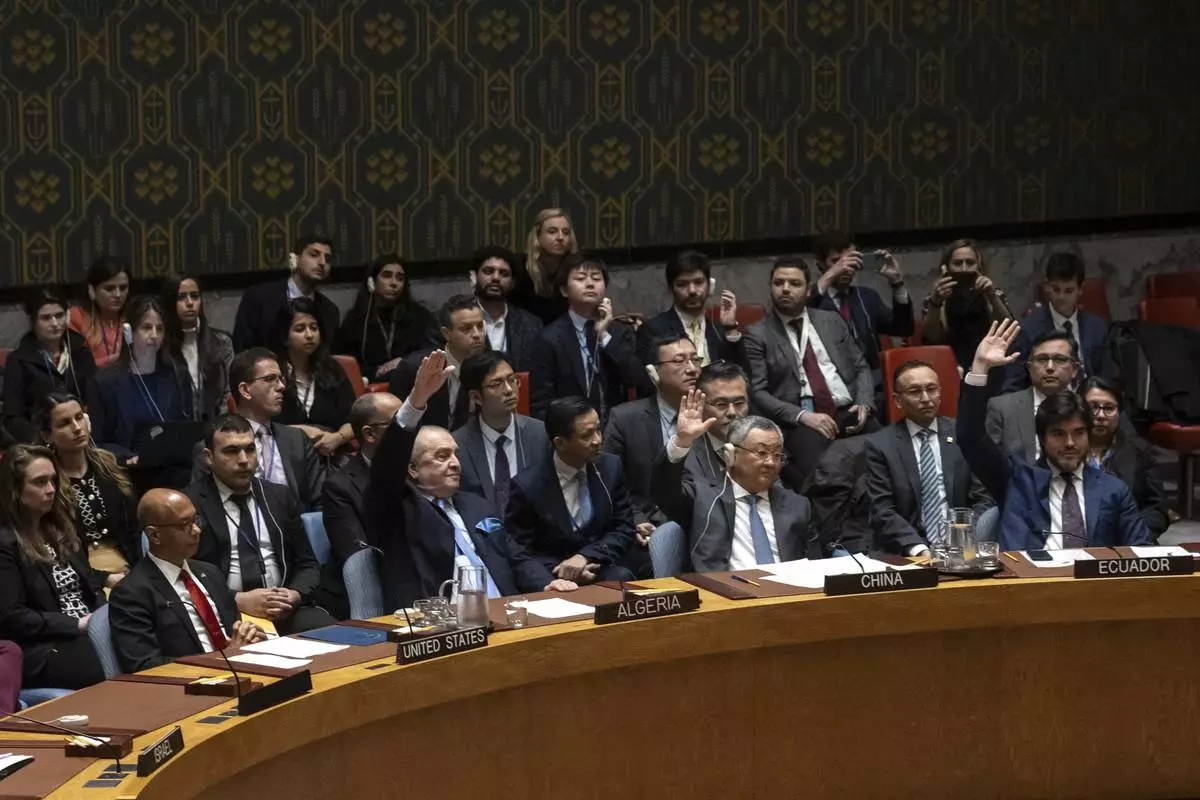
Representatives of member countries take votes during a Security Council meeting at United Nations headquarters, Thursday, April 18, 2024. (AP Photo/Yuki Iwamura)
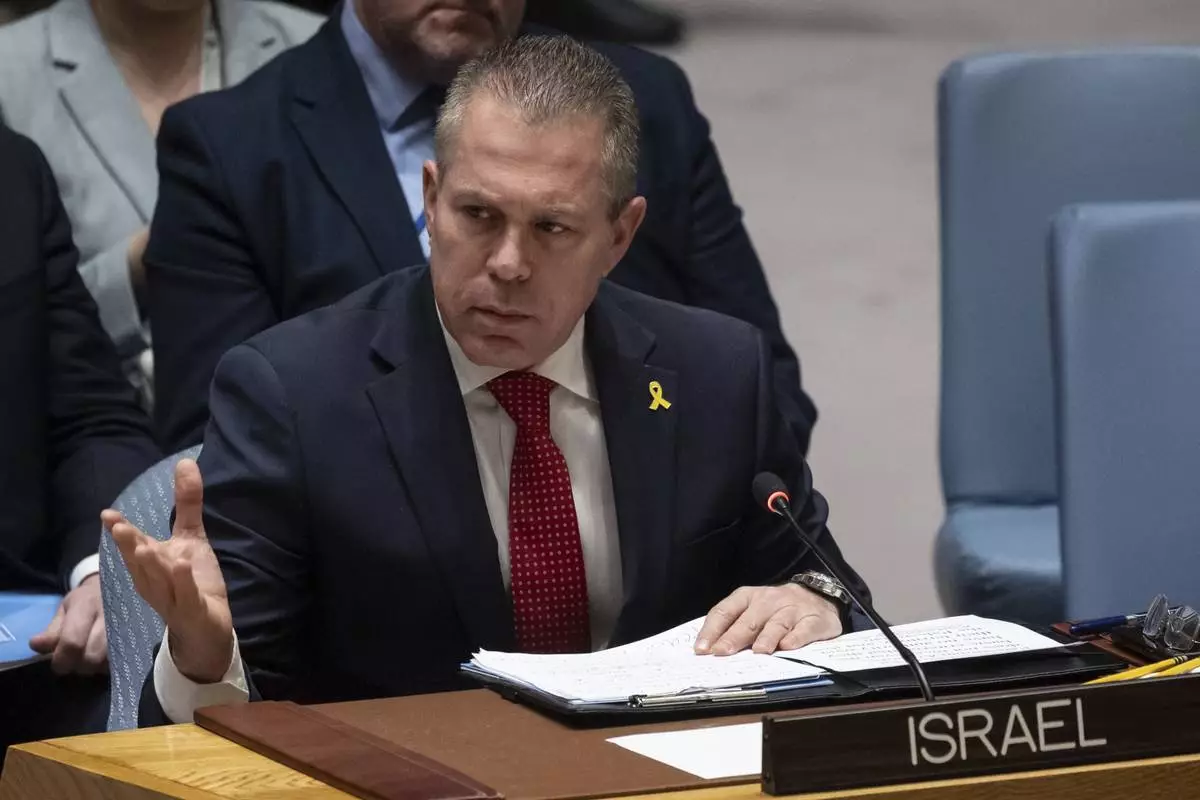
Israeli Ambassador to the United Nations Gilad Erdan speaks during a Security Council meeting at United Nations headquarters, Thursday, April 18, 2024. (AP Photo/Yuki Iwamura)
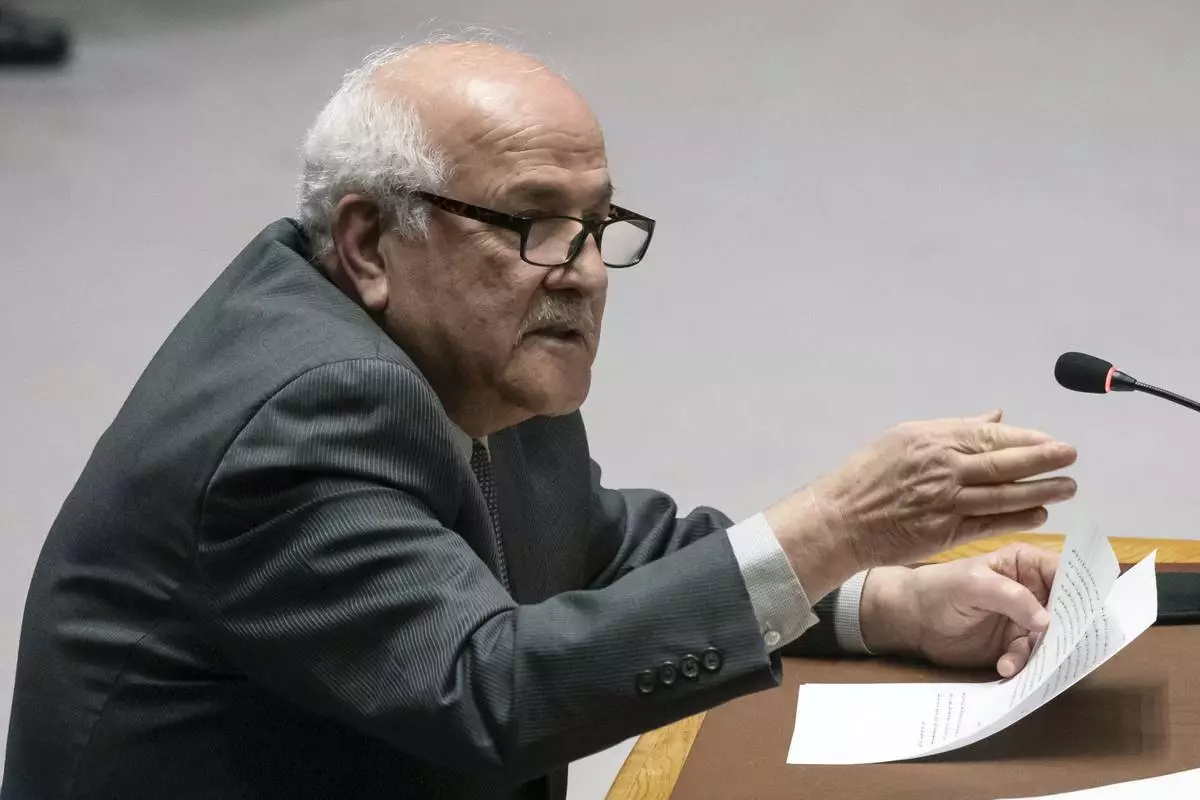
Palestinian Ambassador to the United Nations Riyad Mansour speaks during a Security Council meeting at United Nations headquarters, Thursday, April 18, 2024. (AP Photo/Yuki Iwamura)
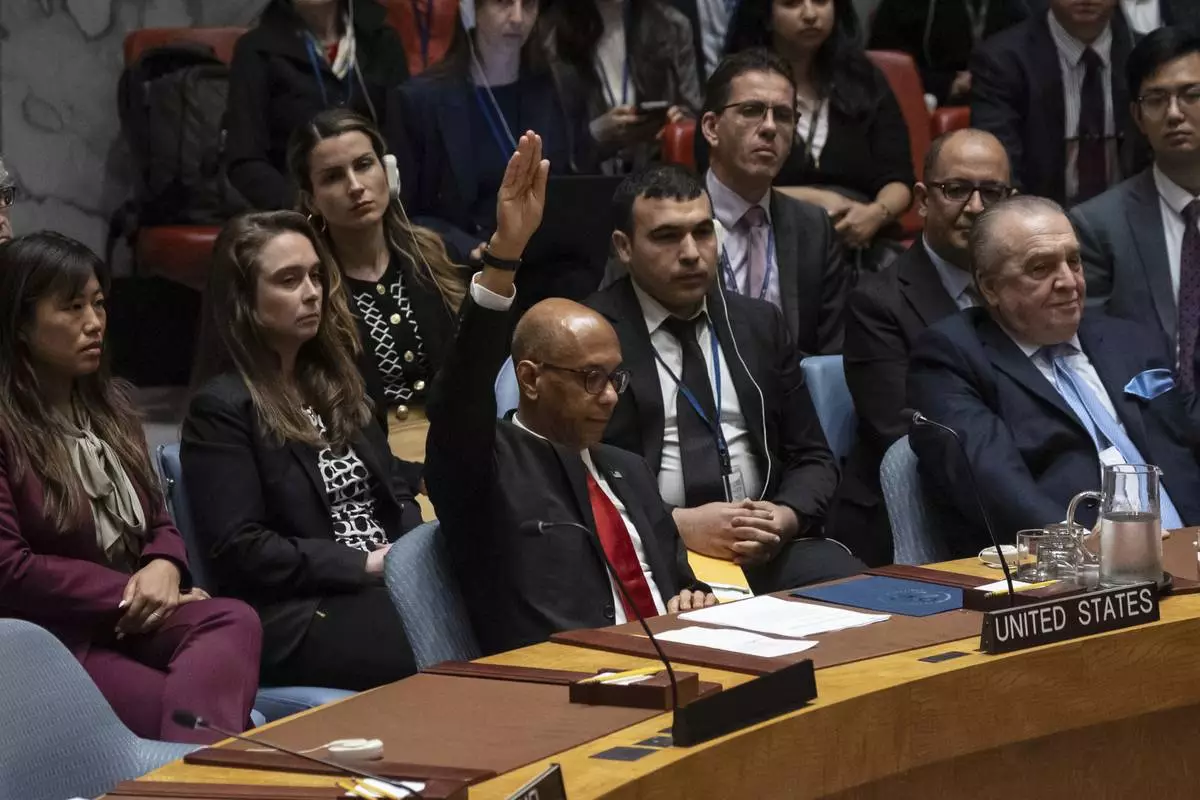
U.S. Deputy Ambassador Robert Wood votes against resolution during a Security Council meeting at United Nations headquarters, Thursday, April 18, 2024. (AP Photo/Yuki Iwamura)






















